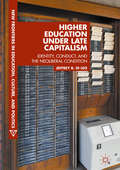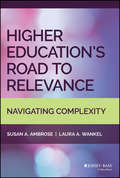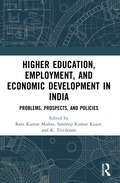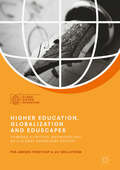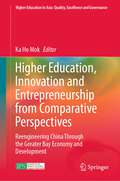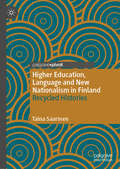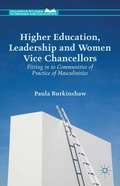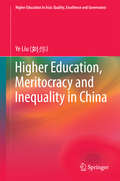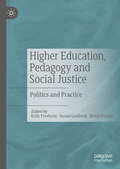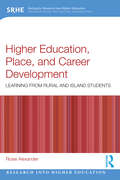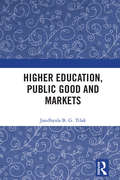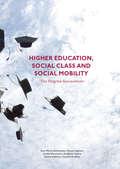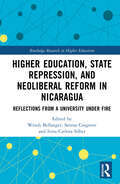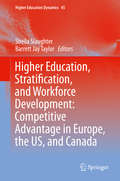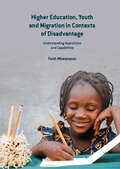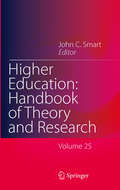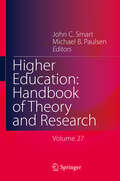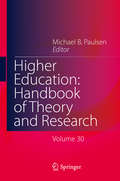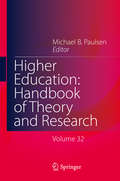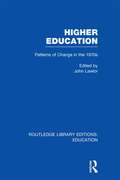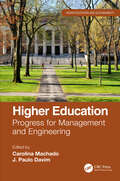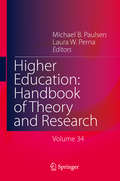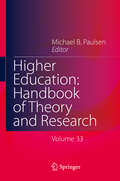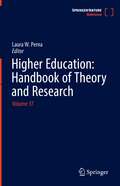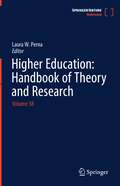- Table View
- List View
Higher Education under Late Capitalism
by Jeffrey R. Di LeoThis book explores questions concerning personal identity and individual conduct within neoliberal academe. The author suggests that neoliberal academe is normal academe in the new millennium though well aware of its contested nature and destructive capacities. Examining higher education through a number of ideals, such as austerity and transparency, brings readers on a journey into its present as well as its past. If some of these ideals can be identified and critiqued, there is a chance that the foundations of neoliberal academe can be weakened. This book actively pursues pathways out of the neoliberal abyss--and offers that demanding a role for pleasure in higher education may be one of them.
Higher Education's Road to Relevance: Navigating Complexity
by Susan A. Ambrose Laura A. WankelExplores the current context, role, and challenges of post-secondary education and presents options for promising pathways forward. The post-secondary educational system has undergone dramatic changes and experienced immense stress in the past two decades. Once regarded as the logical next step toward career opportunities and financial security, higher education is a subject of growing uncertainty for millions of people across the United States. It is more common than ever to question the return on investment, skyrocketing cost, and student debt burden of going to college. Prospective students, and many employers, increasingly view attending institutions of higher learning as inadequate preparation for entering the 21st century workforce. High-profile scandals—financial impropriety, sexual abuse, restrictions of free speech, among others—have further eroded public trust. In response to these and other challenges, leading voices are demanding strengthened accountability and measurable change. Higher Education's Road to Relevance illustrates why change is needed in post-secondary education and offers practical solutions to pressing concerns. The authors, internationally recognized experts in college-level teaching and learning innovation, draw heavily from contemporary research to provide an integrative approach for post-secondary faculty, staff, and administrators of all levels. This timely book helps readers identify the need for leadership in developing new networks and ecosystems of learning and workforce development. This valuable book will help readers: Understand the forces driving change in higher education Develop multiple pathways to create and credential self-directed learners Promote access to flexible, cost-effective, and relevant learning Adapt structures and pedagogies to address issues and overcome challenges Use an inclusive approach that extends to employers, K-12 educators, post-secondary educators, and policy-makers, among others Higher Education's Road to Relevance is a much-needed resource for college and university administrators, academic researchers, instructors and other faculty, and staff who support and interact with students.
Higher Education, Employment, and Economic Development in India: Problems, Prospects, and Policies
by Ram Kumar Mishra, Sandeep Kumar Kujur, and K. TrivikramThis volume examines the role of higher education and employment in economic development in emerging economies like India. It looks at the contours of higher education policies and the labour market dynamics to explore ways to address joblessness and income disparity. The book discusses themes such as quality and access to higher education, the shift towards private investment in higher education, demographic dividend and joblessness among youth, social and income inequalities, labour migration and employment, and the participation of women in the workforce, among others. It provides insights into the challenges relating to employment generation in the industrial sector. It also offers solutions and policy measures to move towards sustainable growth, better employment opportunities in various sectors of industries, and human development. Rich in empirical data, this volume will be of interest to students and researchers of education, economics, development studies, sociology, gender studies, and social and economic policy.
Higher Education, Globalization and Eduscapes: Towards A Critical Anthropology Of A Global Knowledge Society (Palgrave Studies in Global Higher Education)
by Per-Anders Forstorp Ulf MellströmThis book examines transnational scapes and flows of higher education: arguing that the educational and political vision of a national, regional and global knowledge society needs to be perspectivized beyond its ethnocentric conditions and meanings. Using eduscapes as its most important concept, this book explores the educational landscapes of individual as well as institutional actors; particularly the agential aspects of how global eduscapes are imagined, experienced, negotiated and constructed. In addition, the authors highlight the critical potential of anthropology, using this perspective as a resource for cultural critique where the Western experience and assumed ‘ownership’ of the global knowledge economy will be put into question. This comprehensive book will appeal to students and scholars of educational policy, the sociology of education and the globalization of education.
Higher Education, Innovation and Entrepreneurship from Comparative Perspectives: Reengineering China Through the Greater Bay Economy and Development (Higher Education in Asia: Quality, Excellence and Governance)
by Ka Ho MokThis book analyzes how universities in the Greater Bay Area in South China could work together for promoting innovation-centric entrepreneurship, research and knowledge transfer, as well as establishing a leading higher education hub in China mainland. This book brings together leading scholars from history, higher education, sociology, city and urbanism, and development studies, to analyzing the role of higher education, entrepreneurship, and talent hub from historical, comparative, and international perspectives. This book also shares different development experiences of Tokyo, Florida, and New York Bay economies and how higher education has supported their success stories.
Higher Education, Language and New Nationalism in Finland: Recycled Histories
by Taina SaarinenThe book discusses recycled discourses of language and nationalism in Finnish higher education, demonstrating the need to look beyond language in the study of language policies of higher education. It analyses the historical and political layeredness of language policies as well as the intertwined nature of national and international developments in understanding new nationalism. Finnish higher education language policies were fuelled by the dynamics and tensions between the national languages Finnish and Swedish until the 2000s, when English begins to catalyse post nationalist discourses of economy and competitiveness. In the 2010s, English begins to be seen as a threat to Finnish. Educational, economic and epistemic nationalism emerge as the main cycles of new nationalist language policies in Finnish higher education. The book will be of interest to language policy and higher education scholars and practitioners, as well as graduate students language policy and higher education.
Higher Education, Leadership and Women Vice Chancellors
by Paula BurkinshawWhy are there so few women vice chancellors in UK higher education? In this book, Paula Burkinshaw explores the contemporary conversation around the 'missing women at the top' across UK society through in-depth interviews with the (hitherto) silent voices of women vice chancellors. These women have successfully negotiated with and navigated the gendered leadership cultures of higher education throughout their careers and speak of the masculine communities of their workplaces. Advocating the need to achieve a critical mass of women at the top, this book suggests there is still much to be done in the higher education sphere.
Higher Education, Meritocracy and Inequality in China
by Ye LiuThis book investigates the changing opportunities in higher education for different social groups during China's transition from the socialist regime to a market economy. The first part of the book provides a historical and comparative analysis of the development of the idea of meritocracy, since its early origins in China, and in more recent western thought. The second part then explores higher education reforms in China, the part played by supposedly meritocratic forms of selection, and the implications of these for social mobility. Based on original empirical data, Ye Liu sheds light on the socio-economic, gender and geographical inequalities behind the meritocratic fa#65533;ade of the Gaokao (高考). Liu argues that the Chinese philosophical belief in education-based meritocracy had a modern makeover in the Gaokao, and that this ideology induces working-class and rural students to believe in upward social mobility through higher education. When the Gaokao broke the promise of status improvement for rural students, they turned to the Chinese Communist Party and sought political connections by actively applying for its membership. This book reveals a bleak picture of visible and invisible inequality in terms of access to and participation in higher education in contemporary China. Written in an accessible style, it offers a valuable resource for researchers and non-specialist readers alike.
Higher Education, Pedagogy and Social Justice: Politics and Practice
by Helen Proctor Susan Goodwin Kelly FreebodyThis book explores how the concepts of social justice, diversity, equity and inclusion can be understood within the context of higher education. While terms such as these are often in common use in universities, they are not always used with clarity and precision. The editors and contributors offer a serious and detailed examination of pressing contemporary concerns around ‘social justice’ across politics, practice and pedagogy in order to encourage hard thinking and practical agenda setting for social-justice oriented research, teaching and community engagement. Drawing upon new theoretical work, research projects and innovative university teaching, this book offers both useful theoretical insights and practical possibilities for action. This collective and collaborative volume will be of interest and value to all those interested in promoting social justice, in particular how it can be promoted within the university setting.
Higher Education, Place, and Career Development: Learning from Rural and Island Students (Research into Higher Education)
by Rosie AlexanderDrawing connections between the findings of a research project following young graduates from the Scottish islands of Orkney and Shetland, current international evidence, and theoretical literature, this book argues that understanding rural and island student transitions can expose the wider dynamics of place and mobility at play during student and early career experiences.Highlighting the importance of a career perspective, Rosie Alexander encourages readers to consider how career pathways develop across time and across transition points, unsettling the notion of a straightforward transition through university into the workplace. The book uncovers how student trajectories are developed through interweaving dynamics of relationships, place, and career routes and unpacks the implications for policymakers and practitioners. It contends that a much greater spatial awareness is necessary to understand and support the educational and career pathways of higher education students.This is a crucial read for higher education researchers, policymakers, and students interested in rurality as well as access to and transition from higher education.
Higher Education, Public Good and Markets
by Jandhyala B. TilakThis book critically examines some of the major trends in the development of higher education. It demonstrates how in the context of liberalisation, globalisation and marketisation, the crisis in higher education has assumed different dimensions in all advanced and emerging societies. The author shows how the state tends to slowly withdraw from the responsibility of higher education, including in the arena of policy-making, or simply adopts a policy of laissez-faire (of non-involvement) which helps in the rapid unbridled growth of private sector in higher education. The notion of higher education as a public good is under serious contestation in current times. The book argues for the need to resurrect the compelling nature of higher education along with its several implications for public policy and planning, while providing a broad portrayal of global developments, comparative perspectives and key lessons. The volume will be of interest to scholars and researchers of education, political science, public policy and administration, governance, development studies, economics, and those working in the higher education sectors, think-tanks, policymakers as well as NGOs.
Higher Education, Social Class and Social Mobility
by Harriet Bradley Ann-Marie Bathmaker Nicola Ingram Jessie Abrahams Anthony Hoare Richard WallerThis book explores higher education, social class and social mobility from the point of view of those most intimately involved: the undergraduate students. It is based on a project which followed a cohort of young undergraduate students at Bristol's two universities in the UK through from their first year of study for the following three years, when most of them were about to enter the labour market or further study. The students were paired by university, by subject of study and by class background, so that the fortunes of middle-class and working-class students could be compared. Narrative data gathered over three years are located in the context of a hierarchical and stratified higher education system, in order to consider the potential of higher education as a vehicle of social mobility.
Higher Education, State Repression, and Neoliberal Reform in Nicaragua: Reflections from a University under Fire (Routledge Research in Higher Education)
by Serena Cosgrove Wendi Bellanger Irina Carlota SilberThis innovative volume makes a key contribution to debates around the role of the university as a space of resistance by highlighting the liberatory practices undertaken to oppose dual pressures of state repression and neoliberal reform at the Universidad Centroamericana (UCA) in Nicaragua. Using a critical ethnographic approach to frame the experiences of faculty and students through vignettes, chapters present contextualized, analytical contributions from students, scholars, and university leaders to draw attention to the activism present within teaching, research, and administration while simultaneously calling attention to critical higher education and international solidarity as crucial means of maintaining academic freedom, university autonomy, oppositional knowledge production, and social outreach in higher education globally. This text will benefit researchers, students, and academics in the fields of higher education, educational policy and politics, and international and comparative education. Those interested in equality and human rights, Central America, and the themes of revolution and protest more broadly will also benefit from this volume.
Higher Education, Stratification, and Workforce Development
by Sheila Slaughter Barrett Jay TaylorThis work analyses how political economic shifts contribute to competition within higher education systems in the US, EU, and Canada. The authors highlight competition for prestige and public and private subsidies, exploring the consequences of these processes through theoretical and empirical analyses. Accordingly, the work highlights topics that will be of interest to a wide range of audiences. Concepts addressed include stratification, privatization of formerly public subsidies, preference for "high tech" academic fields, and the vocationalization of the curriculum (i. e. , Science, Technology, Engineering and Mathematics: [STEM] fields, selected professions, and business) rather than the liberal arts or the Humboldtian vision of the university. Across national contexts and analytic methods, authors analyze the growth of national policies that see universities as a sub set of economic development, casting universities as corporate research laboratories and education as central to job creation. Throughout the volume, the authors make the case that national and regional approaches to politics and markets result in different experiences of consequences of academic capitalism. While these shifts serve the interests of some institutions, others find themselves struggling to meet ever-greater expectations with stagnant or shrinking resource bases.
Higher Education, Youth and Migration in Contexts of Disadvantage: Understanding Aspirations and Capabilities
by Faith MkwananziThis book explores the lives, experiences and the formation of higher educational aspirations among marginalised migrant youth in South Africa. Using a case study based in Johannesburg, the author illuminates their voices in order to demonstrate the reality faced by these young people in the context of migration to the Global South. Within the complex landscape of global and African migration, this book draws on detailed narratives to understand the conditions under which aspirations for higher education are – or are not – developed. In doing so, the author highlights the value of understanding individual lives, experiences and opportunities from a human development point of view, capturing the multidimensional disadvantages experienced by migrants in a balanced, intersectional manner. Balancing empirical data with theoretical analysis, this volume tells a rich, nuanced story about marginalised migrant youth – an essential work for understanding the conditions necessary for such youth to live valuable lives in both local and international contexts. This book will appeal to students and scholars of youth migration, aspiration and educational opportunities, particularly within the Global South.
Higher Education: Handbook of Theory and Research
by John C. SmartPublished annually since 1985, the Handbook series provides a compendium of thorough and integrative literature reviews on a diverse array of topics of interest to the higher education scholarly and policy communities. Each chapter provides a comprehensive review of research findings on a selected topic, critiques the research literature in terms of its conceptual and methodological rigor, and sets forth an agenda for future research intended to advance knowledge on the chosen topic. The Handbook focuses on twelve general areas that encompass the salient dimensions of scholarly and policy inquiries undertaken in the international higher education community. The series is fortunate to have attracted annual contributions from distinguished scholars throughout the world.
Higher Education: Handbook of Theory and Research
by John C. Smart Michael B. PaulsenPublished annually since 1985, the Handbook series provides a compendium of thorough and integrative literature reviews on a diverse array of topics of interest to the higher education scholarly and policy communities. Each chapter provides a comprehensive review of research findings on a selected topic, critiques the research literature in terms of its conceptual and methodological rigor, and sets forth an agenda for future research intended to advance knowledge on the chosen topic. The Handbook focuses on twelve general areas that encompass the salient dimensions of scholarly and policy inquiries undertaken in the international higher education community. The series is fortunate to have attracted annual contributions from distinguished scholars throughout the world.
Higher Education: Handbook of Theory and Research
by Michael B. PaulsenPublished annually since 1985, the Handbook series provides a compendium of thorough and integrative literature reviews on a diverse array of topics of interest to the higher education scholarly and policy communities. Each chapter provides a comprehensive review of research findings on a selected topic, critiques the research literature in terms of its conceptual and methodological rigor and sets forth an agenda for future research intended to advance knowledge on the chosen topic. The Handbook focuses on a comprehensive set of central areas of study in higher education that encompasses the salient dimensions of scholarly and policy inquiries undertaken in the international higher education community. Each annual volume contains chapters on such diverse topics as research on college students and faculty, organization and administration, curriculum and instruction, policy, diversity issues, economics and finance, history and philosophy, community colleges, advances in research methodology and more. The series is fortunate to have attracted annual contributions from distinguished scholars throughout the world.
Higher Education: Handbook of Theory and Research
by Michael B. PaulsenPublished annually since 1985, the Handbook series provides a compendium of thorough and integrative literature reviews on a diverse array of topics of interest to the higher education scholarly and policy communities. Each chapter provides a comprehensive review of research findings on a selected topic, critiques the research literature in terms of its conceptual and methodological rigor and sets forth an agenda for future research intended to advance knowledge on the chosen topic. The Handbook focuses on a comprehensive set of central areas of study in higher education that encompasses the salient dimensions of scholarly and policy inquiries undertaken in the international higher education community. Each annual volume contains chapters on such diverse topics as research on college students and faculty, organization and administration, curriculum and instruction, policy, diversity issues, economics and finance, history and philosophy, community colleges, advances in research methodology and more. The series is fortunate to have attracted annual contributions from distinguished scholars throughout the world.
Higher Education: Patterns of Change in the 1970s (Routledge Library Editions: Education #15)
by John LawlorThis volume focuses on the changing pattern of tertiary education in the UK and the emphasis of the contributions is on the challenges and opportunities rather than the problems and difficulties of educationists at this level. The contributors are all leading figures in the educational world, and they are concerned in particular with the need for a partnership in the definition of aims and capabilities in higher education, in order to meet future needs. The potential of the (new) polytechnics and the use and interpretation of student/staff ratios, and the difficulties of interdisciplinary education are discussed.
Higher Education: Progress for Management and Engineering (Higher Education and Sustainability)
by Carolina MachadoIncreasing corporate social responsibility demands professionals possess the necessary knowledge, abilities, and competencies to answer the needs of a diverse organization’s stakeholders. This book highlights the most recent issues related to higher education in the fields of management and engineering. It explains why a sustainable education is a requirement for professionals, as well as the organizations they collaborate with.Higher Education: Progress for Management and Engineering focuses on the latest research findings in the field of higher and sustainable education. It discusses the progress, shares knowledge and insights on an international scale, and highlights the challenges faced to obtain and secure a more responsible and sustainable management system. Selecting different options and strategies, how to set priorities on managing competition, and how to succeed as an organization that can lead to successes in both national and international markets are covered within this book.This book can be used as a reference for researchers, academics, managers, engineers, and other professionals involved in higher and sustainable education in management and engineering.
Higher Education: Published Under The Sponsorship Of The Association For Institutional Research (AIR) And The Association For The Study Of Higher Education (ASHE) (Higher Education: Handbook of Theory and Research #33)
by Laura W. Perna Michael B. PaulsenPublished annually since 1985, the Handbook series provides a compendium of thorough and integrative literature reviews on a diverse array of topics of interest to the higher education scholarly and policy communities. Each chapter provides a comprehensive review of research findings on a selected topic, critiques the research literature in terms of its conceptual and methodological rigor and sets forth an agenda for future research intended to advance knowledge on the chosen topic. The Handbook focuses on a comprehensive set of central areas of study in higher education that encompasses the salient dimensions of scholarly and policy inquiries undertaken in the international higher education community. Each annual volume contains chapters on such diverse topics as research on college students and faculty, organization and administration, curriculum and instruction, policy, diversity issues, economics and finance, history and philosophy, community colleges, advances in research methodology and more. The series is fortunate to have attracted annual contributions from distinguished scholars throughout the world.
Higher Education: Volume 28 (Higher Education: Handbook of Theory and Research #28)
by Michael B. PaulsenPublished annually since 1985, the Handbook series provides a compendium of thorough and integrative literature reviews on a diverse array of topics of interest to the higher education scholarly and policy communities. Each chapter provides a comprehensive review of research findings on a selected topic, critiques the research literature in terms of its conceptual and methodological rigor and sets forth an agenda for future research intended to advance knowledge on the chosen topic. The Handbook focuses on a comprehensive set of central areas of study in higher education that encompasses the salient dimensions of scholarly and policy inquiries undertaken in the international higher education community. Each annual volume contains chapters on such diverse topics as research on college students and faculty, organization and administration, curriculum and instruction, policy, diversity issues, economics and finance, history and philosophy, community colleges, advances in research methodology and more. The series is fortunate to have attracted annual contributions from distinguished scholars throughout the world.
Higher Education: Volume 37 (Higher Education: Handbook of Theory and Research #37)
by Laura W. PernaPublished annually since 1985, the Handbook series provides a compendium of thorough and integrative literature reviews on a diverse array of topics of interest to the higher education scholarly and policy communities. Each chapter provides a comprehensive review of research findings on a selected topic, critiques the research literature in terms of its conceptual and methodological rigor and sets forth an agenda for future research intended to advance knowledge on the chosen topic. The Handbook focuses on a comprehensive set of central areas of study in higher education that encompasses the salient dimensions of scholarly and policy inquiries undertaken in the international higher education community. Each annual volume contains chapters on current important issues pertaining to college students and faculty, organization and administration, curriculum and instruction, policy, diversity issues, economics and finance, history and philosophy, community colleges, advances in research methodology and other key aspects of higher education administration. The series is fortunate to have attracted annual contributions from distinguished scholars throughout the world.
Higher Education: Volume 38 (Higher Education: Handbook of Theory and Research #38)
by Laura W. PernaPublished annually since 1985, the Handbook series provides a compendium of thorough and integrative literature reviews on a diverse array of topics of interest to the higher education scholarly and policy communities. Each chapter provides a comprehensive review of research findings on a selected topic, critiques the research literature in terms of its conceptual and methodological rigor and sets forth an agenda for future research intended to advance knowledge on the chosen topic. The Handbook focuses on a comprehensive set of central areas of study in higher education that encompasses the salient dimensions of scholarly and policy inquiries undertaken in the international higher education community. Each annual volume contains chapters on current important issues pertaining to college students and faculty, organization and administration, curriculum and instruction, policy, diversity issues, economics and finance, history and philosophy, community colleges, advances in research methodology and other key aspects of higher education administration. The series is fortunate to have attracted annual contributions from distinguished scholars throughout the world.
